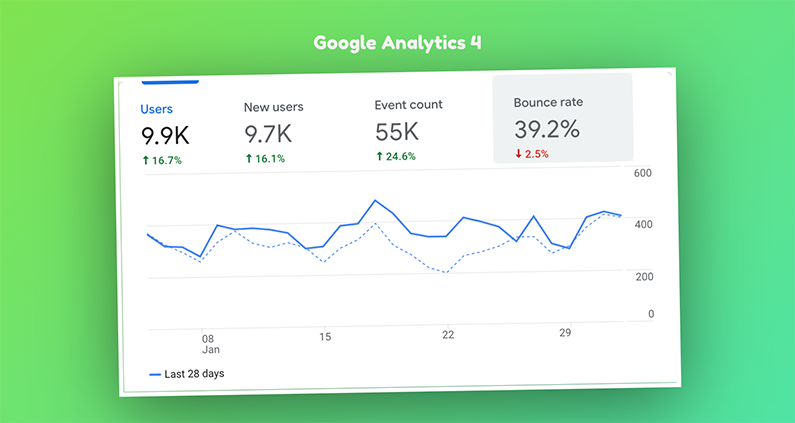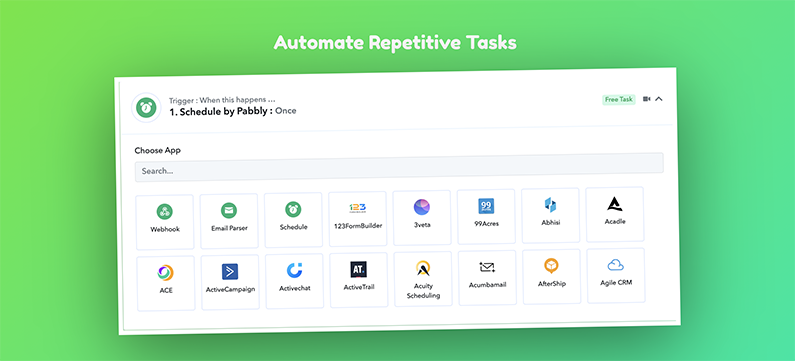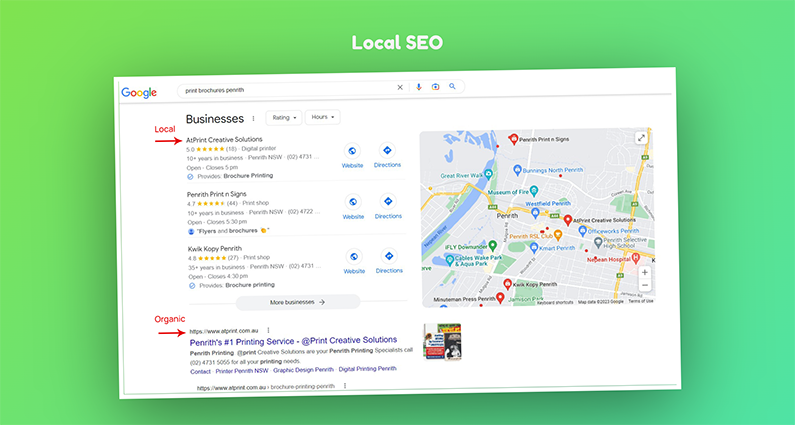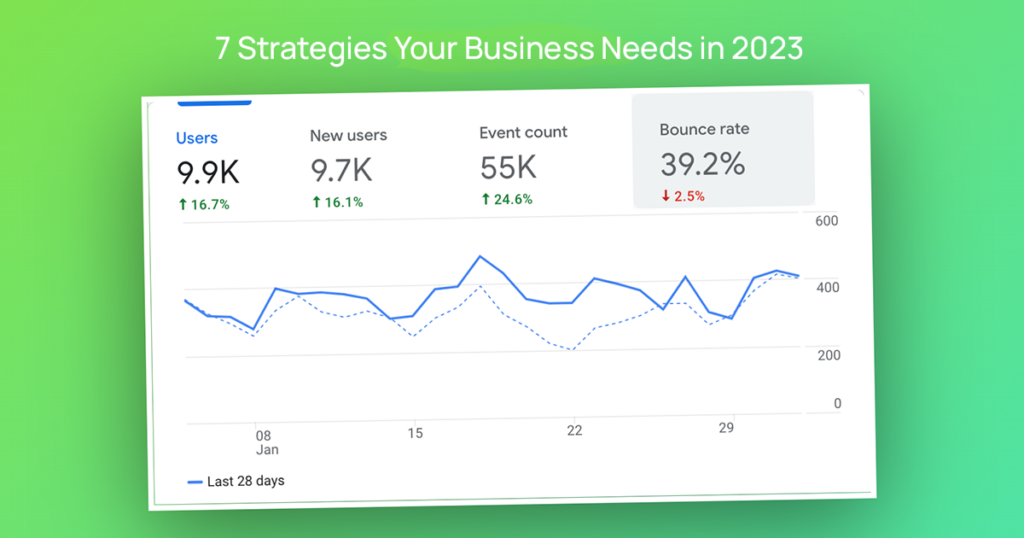I get it, there is a shiny object on the horizon and a million things to do to kick off 2023. But please hear me out, as a small business owner, it’s important to stay ahead of the game and make sure your business is prepared for whatever this year may bring. I have compiled my 7 best tips that I believe will help build a foundation for your business to thrive in 2023.
1. Upgrade to Google Analytics 4
In case you’re unfamiliar with Google Analytics, it is a marketing platform that helps website owners understand how people use their website by showing them information like how many people visit, where they come from and what pages they look at. It’s a free service offered by Google and is considered industry-standard among digital marketers.
Most business websites now would be running some form of Universal Analytics (Google Analytics 3) which is about to stop working come July. This means that if you haven’t already, it’s time to upgrade to Google Analytics 4 (or GA4) otherwise you will lose the ability to track metrics like most visited pages, audience demographics and the attribution of sales and lead form submissions.

2. Take advantage of Artificial Intelligence
Artificial intelligence refers to technology that allows machines to mimic human thinking and behaviour, such as learning and problem-solving. In simple terms, it’s a computer that can “think” and “act” like a human.
New technologies have hit the market and like it or not, AI is here and likely to be the biggest disruptor of technology since the inception of the world wide web. In fact, 2024 might look very different from 2023.
Right now, new and notable AI products that have entered the market could be a “game changer” for small businesses. There is Midjourney which can generate high-quality images from a “prompt” or a simple statement that describes the image you want to create.
Another is ChatGPT which has the ability to get and write content such as blog articles, email newsletters, and marketing plans along with answering complex questions to writing code for apps and websites. In fact, ChatGPT has actually assisted me to write this article.
At the time of writing, ChatGPT (account required) is free and worth checking out right now. This platform is a disruptor so get on it!

3. Automate your workflow
In one of my favourite books called “Atomic Habits” by James Clear, there is the case that is made that small consistent improvements can lead to significant progress over time. He emphasises the importance of making small changes, rather than trying to make big changes all at once
I know as a small business owner you have a lot on your plate. So instead of working on your pebbles, look for small tweaks with automation allowing you to work on your rocks!
Apps like Zapier and Pabbly Connect are two examples of such tools that will help streamline your business processes and avoid the chaos of human error which occurs when staff perform repetitive tasks.
Both Zapier and Pabbly Connect allow you to combine different online apps and services so that they can work seamlessly together. For example, you can use Zapier to automatically create new contacts in your CRM software every time someone fills out a lead form on your website. And/or, you can use Pabbly Connect to automatically create an invoice in Xero when an order is placed on your Shopify or WooCommerce store.
One of the biggest benefits of using tools like Zapier and Pabbly Connect is that they can save you a lot of time. Instead of manually inputting data or performing tasks, these tools can take care of it for you. This means you can spend more time focusing on other important aspects of your business.

4. Invest in SEO
Bit of a conflict of interest here, but as an SEO Penrith agency, I see SEO as a no-brainer for small businesses. Search Engine Optimisation is the process of increasing your online visibility and driving more traffic to your website. This can lead to more contacts, sales, and ultimately revenue for your business.
There are two types of SEO you’ll want to consider: Local and organic SEO. Local SEO is about optimising your presence in Google Maps, which appears above organic results but underneath Google Ads, for target keywords in search engine results.
As a small business owner, you’ll definitely want to consider Local SEO. This type of SEO is particularly important for small businesses that serve a specific geographic area and can allow you to slip above the big guys that may appear before your business in organic search results, enabling you to level the playing field.

5. Nurture your leads
Something we see a lot… Many business owners believe that a lead is not interested unless they convert during the first interaction. However, a more effective approach is to have a sales process for leads who are still considering their options.
When a person expresses interest in your business’s products or services, they become a lead. However, just because someone is a lead, it doesn’t mean they’re ready to buy or hire you. Nurturing leads means actively working to build a relationship with that prospect and guiding them through the sales process.
Humans are creatures of habit and it’s in our nature to be indecisive. Look for reasons why a prospect has not converted into a customer. This can come down to a lack of trust in your business, insufficient funds or a sales process with no sense of urgency.
Here are just a few examples of how you can nurture your leads:
- Send them an email or a series of emails over specific intervals
- Retargeting to them with Facebook Ads
- Pick up the phone and call them (it doesn’t need to be complicated)

6. Improve your websites user experience
I want you to do something right now, I want you to pick up your mobile and pretend you’re a customer looking for your products or services. Go to your website and see what the journey looks like.
Did the page layout shift around as the page loaded? Was there a large annoying carousel that didn’t give you enough time to read the text? Did it take more than 2 seconds to load? Was your product or service obvious and easy to find? Was your point of difference or benefits clearly defined? Were you able to submit a form lead or purchase a product easily?
We call this journey, UX or User eXperience. This refers to the overall experience a user has when interacting with a website.
The reality is small marketing budgets often turn into terrible ThemeForest WordPress websites from agencies that focus on churning out products more than they are on getting you leads and sales. As a small business owner, you’re none the wiser and at their discretion.
Improving your UX will improve your customer’s experience and this will improve your leads generation, sales and brand experience. If you’re directing traffic to your website through Facebook and Google Ads, you will also make your dollars go further through higher conversion rates.

7. Create a unified content strategy
Staff hate writing blogs but they love posting content on Instagram and Facebook. I get it, blogging is an island that is tedious, complicated and time-consuming while social posting has reactions, comments, love hearts and smiley faces delivering the dopamine.
I see too many businesses that have set up a quarantine zone around the content strategy. Each channel acts as a loner in their own right. But what if I told you they all work better together?
Pick a topic about your services or products. Let’s say you’re an accounting firm and you want to help your clients automate some of their bookkeeping processes with some data capture tools. You could write a blog “3 tools to automate your bookkeeping” and that could be as far as it goes.
Or you could take that blog post and turn it into multiple pieces of content. For example, that blog could also be 4 separate posts on Facebook posted at different intervals. Posts 1, 2 and 3 act as awareness for the task and a fourth post empowering clients to action by allowing ABC Accounting to position this as a sellable service for clients that do not have the capacity to follow your article.
This strategy can be confused with something called ‘content repurposing’ which is the process of taking existing content and adapting it to new formats, which is something you should also do, but the concept is similar.
We want to consider your content appearing on other platforms at the time of its inception so we can break it down into short bite-sized snippets as it’s easier for audiences to consume. Everyone absorbs content differently and this strategy will help share the dopamine around the office.

Well, that’s it, folks, there you have it! The things your business needs to do in 2023 to stay ahead of the game. Remember, running a small business is no easy feat so I hope this content serves you well. Here’s to a prosperous and exciting 2023 for all small business owners out there!






